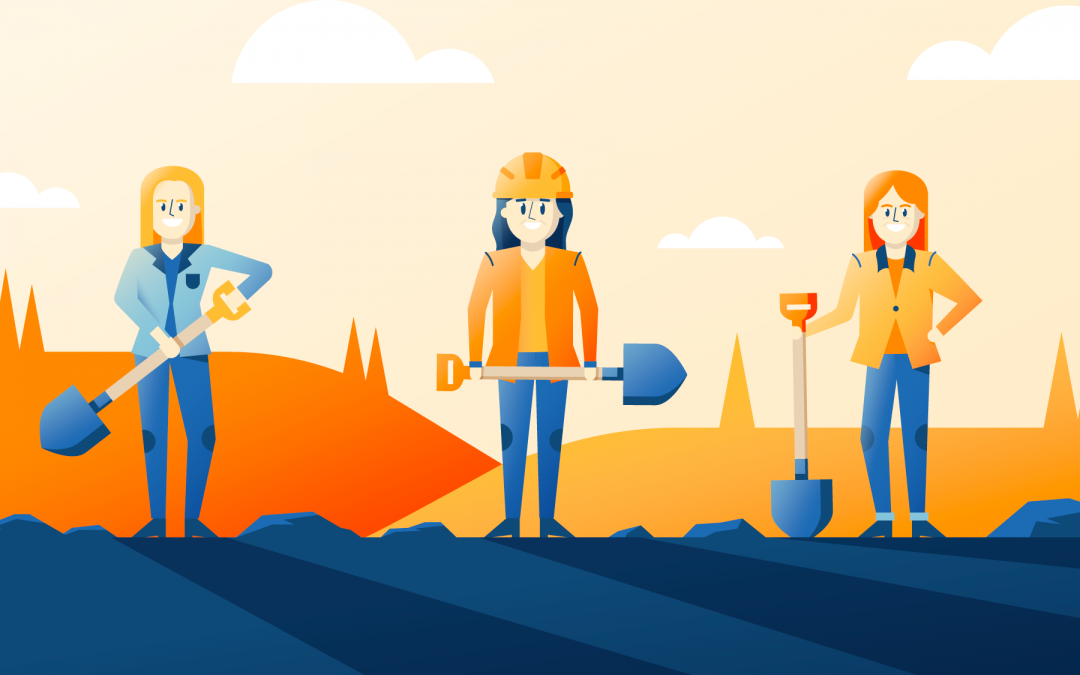Women in Engineering. Let’s Talk About…
Human resources • Industry matters
… Breaking the stigma about PERIODS!
By Alice Tettmar
Ground and Water is naming September 2020 as our first ever Women in Engineering Month. A month dedicated to providing a platform for our female workforce to speak about their experiences and share their passion for engineering and leadership. We kick the month off by sharing our female engineering team’s experiences of the difficulties it faces by not having access to standardised welfare facilities within the construction industry.
“Those toilets are used for storage”. “I don’t know where the key is for the girl’s loo”. “Can’t you just use the men’s?” If any of these statements sound familiar, the chances are, you are a woman working on a construction site trying to find suitable welfare facilities. With the number of women in the construction and engineering sectors on a much welcomed rise; isn’t it time we broke the stigma and talked about “that annoying thing” that affects almost 50% of the population on a monthly basis…Periods?
With a 50/50 gender split at Ground and Water and with our current technician site team being two thirds female, we could talk endlessly about our shared experiences of being caught without sanitary products or unable to find suitable welfare facilities. But how can we open this debate in the wider community and industry? What can be done to break the stigma in an industry where women account of 12.5% of the construction and engineering work force and just 1% of the front-line construction workforce? Here at Ground and Water, we want our voices to be heard, so we can help to start to #breakthestigma.
Having a period while working onsite, often away from local facilities or on large construction sites, is in a nutshell, a nightmare. Due to the nature of our job – geotechnical / environmental engineers – we are often driving around throughout the day or we carry out our work on remote sites, long before the main contractors move in. Speaking from our experience, the facilities for women on active construction sites are often the other end of the site, away from the office or male facilities. They are locked or inaccessible because they are being used for other purposes and female sanitary facilities and products are simply non-existent. Not a situation that would be tolerated or allowed in an office.
Part of the UK’s H&S guidance outlines that sanitary disposal should be supplied on any construction site and the Considerate Construction Scheme includes that all sites must “provide and maintain high standards of welfare” while “caring for the health and well being of their workforce”. However, it is shocking to see the number of sites that proudly display being part of the Considerate Construction Scheme, yet do not supply sanitary disposal or a basic level of hygiene in the female toilets as a minimum. To put this into perspective, women in the Army account for 9% of soldiers, yet the Army provides mobile female welfare units on training areas for exercising units and permanent welfare units at all bases, which provide sanitary disposal and a hygienic environment.
Our individual experiences range from sub-contractors visibly recoiling when reaching into our site boxes to find a box of tampons, to resorting to the back of a van to go to the toilet amongst the soil samples or just not going to the toilet throughout the day (which in itself poses all sorts of health risks). And this is just the norm. A systemic issue, is feeling it is up to us to ensure we are always prepared, should we start our period in the middle of a work day, or not feeling like period pain is a legitimate reason to need a day at home or off sick.
And this isn’t just an issue faced by us women in engineering or construction; a study by BUPA found that 46% of women in the workplace do not feel that period pain would be seen as a legitimate reason for having sick leave, with 58% using the much more socially acceptable “stomach bug” as the reason.
A campaign lead by Unite, a workers union across multiple sections that battle for equality and workers rights, called #perioddignity has called on the construction industry to be accountable for providing suitable facilities and resources for period-sufferers. Here at Ground and Water, we are excited to be part of this movement and passionately believe, that in order to close the gender gap in the industry, the work environment must promote safe and open working conditions for women.
As a start Ground and Water has formalised its ‘Period Pledge’. This is a list of actions we will take to ensure the health and safety of our workforce:
- Provide free sanitary products at disposal facilities or office, extending to individual’s site box (male and female) and company van
- Emergency period kits within the company vans, including cans of clean water, disposable underwear, baby wipes and disposable bags
- For sites within long-running site works, a toilet cabinet will be provided throughout
- An open-door policy between all team members, with the free ability to swap site works if suffering from period pain or discomfort and report sick days as period pain
- Where appropriate, in-prompt working from home days alongside our existing flexi-working policy.
We are also excited to announce that for each new commission throughout the month of September, we will donate a lump sum per job, to Freedom4Girls, a UK registered charity fighting against period poverty across the UK and part of East Africa; making sanitary products readily available for everyone and breaking the stigma around menstruation. More details can be seen below:
https://www.freedom4girls.co.uk/
We hope you join us in a combined effort to #breakthestigma. For more details on the Unite Period Dignity Campaign and how YOU can do your bit in an industry that so desperately needs rallying, please click the link:
https://unitetheunion.org/campaigns/construction-period-dignity/
